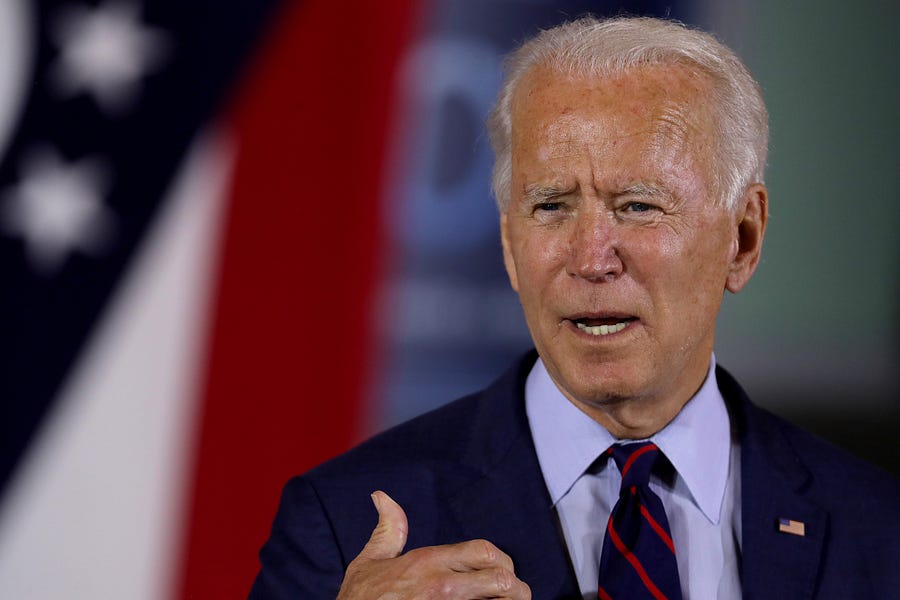If one could do the virtually impossible and put aside President Trump’s daily antics and tweets, one might be surprised that he’s as far behind in the polls as he apparently is. According to the RealClearPolitics aggregate average, the president is behind Joe Biden nationally by nearly 10 points and trailing in a number of battleground states, including Pennsylvania, North Carolina, Wisconsin and, crucially, even Florida.
In two key policy areas, the economy and foreign policy, Trump should be doing better in the polls than he is. While the economy has suffered greatly throughout the pandemic, Trump is still routinely ahead of Biden in polls taken about who would handle the nation’s economy better, and Trump has no debilitating wars on his resume that an opposition can rally the public around. More generally, a recent Gallup poll asked registered voters “whether you agree or disagree with [Trump or Biden] on the issues that mean most to you.” Forty-nine percent said they agreed with Trump on their most important issues, while 46 percent said the same thing of Biden.
Indeed, the same Gallup poll, taken in mid-to-late September, asked: “Would you say you and your family are better off now than you were four years ago, or are you worse off now?” Fifty-six percent affirmed that they were better off. And, remarkably, as Gallup notes, that number is actually higher than what it was for Ronald Reagan, George W. Bush, and Barack Obama at similar points before they were re-elected to office.
If Joe Biden wins on November 3, it will be for any number of reasons, including Trump’s handling of the pandemic and the failure of the administration to come up with an alternative to Obamacare. These are serious policy issues, to be sure. But an equally important reason may be, ironically, a conservative one. As the Gallup poll also points out, when it comes to the personal qualities a president should have, more of those surveyed believed Biden embodies them than believe Trump does. It may be that those Americans who voted for Trump before and won’t this time will do so because they perceive his behavior as breaking norms about how a president should act.
The list of Trump’s problematic behavior is long: using his pardon power to protect friends in dubious cases; regularly pressuring the nation’s chief law enforcement officers (attorney generals and FBI heads) to do his personal bidding; ignoring statutory appropriations; regularly filling senior administration posts without Senate consent; making outlandish claims about his own authority and freedom from congressional oversight; writing checks to cover up a scandal; using foreign aid to squeeze a foreign leader to help him politically; involving his personal attorney in foreign affairs; co-mingling his family and financial interests with that of the government; and openly questioning whether he will abide by the results of the election. With Trump using the “bully pulpit” as a pulpit to bully others, “decent folk,” as one used to say, see this behavior as putting tinder under existing social divisions. They see it as a way of increasing civic strife—not alleviating it.
It’s of course true that many, if not most, presidents have been hypocrites in hiding their political and personal calculations behind the seal of the Oval Office. But that’s the point: They understood that there were still expectations they had to meet in the public’s eye as occupants of this high constitutional office.
The president was the only constitutional officer whom the Founders thought should be given a public home—the White House. Their reasoning was simple enough. The job of the nation’s chief executive is 24/7, seeing that the laws remain in force and the nation’s security is sustained. Because of the nature of the president’s responsibilities, where he resided would necessarily be his office. But Trump often seems to assume, like the developer he is, that winning the presidency means owning the office rather than being its occupant. Accepting the Republican nomination on the South Lawn of the White House captures in one striking moment how Trump so often conflates his interests with that of the office.
Although it’s true that, because of polarization, nearly 40 percent of the country would almost certainly have opposed Trump and another 40 percent would have supported him on policy grounds alone, it’s quite possible that the decisive factor in this election will be individuals who may even agree with much of the Trump agenda but believe he is unfit for the office. What is implicit here is that, for a decisive number of voters, character matters as it impacts the health of the political order. It mattered in 2016 of course but, now, the character of the incumbent in practice has been revealed to the voting public. Most of these decisive voters will not dive deeply into why they will be voting against the president. But it is heartening nonetheless that they feel this old-fashioned, conservative notion in their bones.
Photograph by Chip Somodevilla/Getty Images.






Please note that we at The Dispatch hold ourselves, our work, and our commenters to a higher standard than other places on the internet. We welcome comments that foster genuine debate or discussion—including comments critical of us or our work—but responses that include ad hominem attacks on fellow Dispatch members or are intended to stoke fear and anger may be moderated.
You are currently using a limited time guest pass and do not have access to commenting. Consider subscribing to join the conversation.
With your membership, you only have the ability to comment on The Morning Dispatch articles. Consider upgrading to join the conversation everywhere.